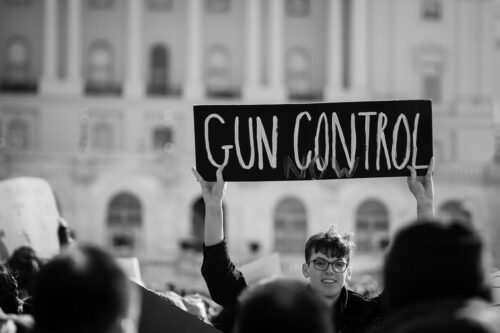Image courtesy of Lorie Shaull via Flickr.
What are the most pressing and controversial issues in the United States? There are a lot of issues that come to mind with ease. But what issue affects the country’s population most disproportionately? And what has surged over the past two decades with minimal legislative intervention?
Did you think of gun violence?
The United States is a global force in economics, education, and entrepreneurship—and yet, our firearm homicide rate is higher than the other twenty-two most developed countries combined. For three years now, firearms have been the number one cause of death among children and teens, surpassing cancer and car crashes.
Health scholars increasingly recognize gun violence as a public health crisis, advocating for strategies rooted in public health principles. This approach involves defining and monitoring the problem, identifying risk and protective factors, developing prevention strategies, and ensuring large-scale policy implementation.
In Episode 8 of the Shared Humanity podcast, two passionate women sit together and discuss the pressing firearm issue through a public health framework and under a hopeful lens. This topic is deeply personal for host Nelba Marquez-Greene, who lost her daughter in the Sandy Hook Elementary School shooting. Drawing from personal experience and expertise in activism, she collaborates with scholars and communities to address firearm violence. She is joined by Megan Ranney, dean of the Yale School of Public Health and an emergency physician who testified to Congress on gun violence as a public health issue.
Gun control has long been a contentious issue in the US. The Gun Control Act of 1968 restricted convicted felons from purchasing guns, and mandated gun sellers to keep customer records. However, legislative efforts have frequently stalled, with resistance rooted in Second Amendment debates and cultural attitudes toward gun ownership.
A public health approach can address the alarming rise in gun violence of recent decades. “I partner for example with 4H, an incredible youth empowerment organization that helps proactively keep the youth safe,” Ranney said. By applying public health principles at the community level, researchers and policymakers can advance practical, data-driven solutions to curb firearm violence.
By identifying gun violence as a public health issue, evidence-based interventions can be developed and scaled. In the podcast, Ranney highlights early childhood education programs, targeted interventions for at-risk youth, and environmental changes as powerful tools in reducing gun-related harm. These strategies, grounded in rigorous research, are continuously refined to create lasting, widespread impact.

